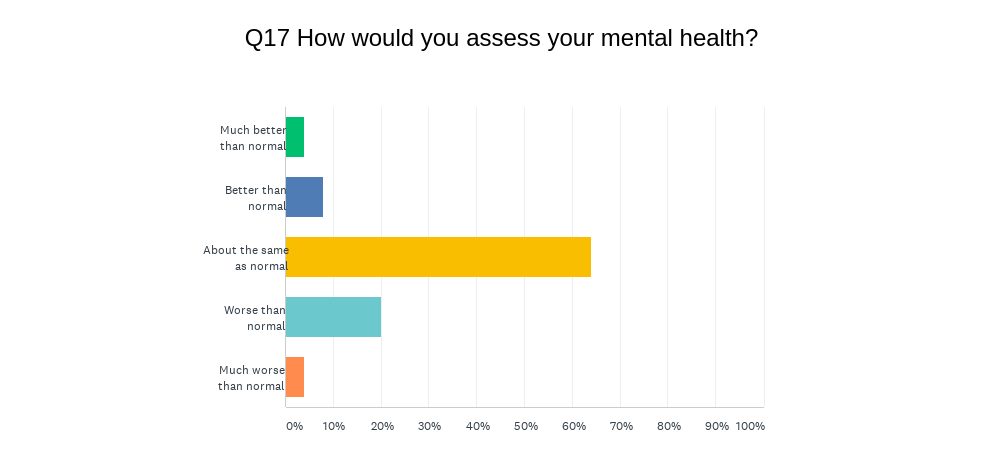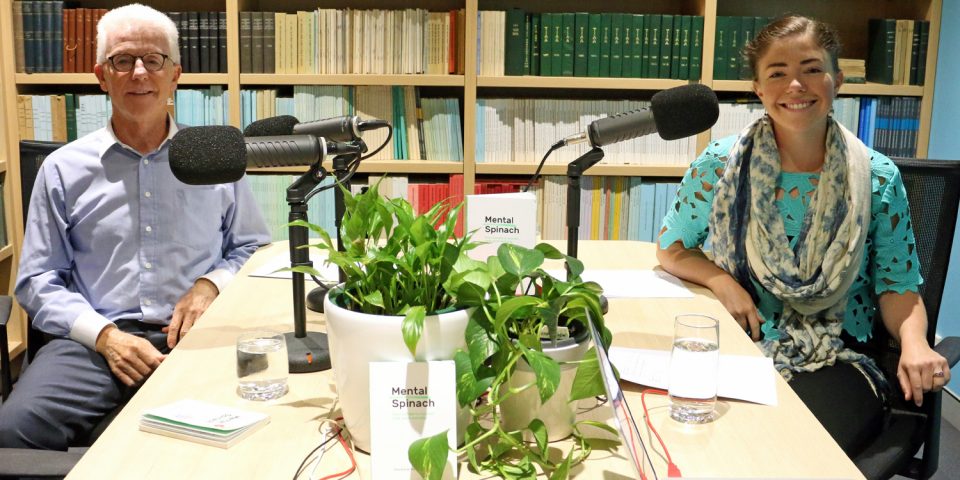
Managing Our Mental State
In this week’s article we consider the potential influence of COVID-19 on our mental health. There is no doubt that everyone is coping differently with the significant changes that have taken place in the last few months.
The survey only asked one simple question about mental health. A few people have requested that we delve deeper to understand and address the results:

Let’s start by reflecting on what may have adversely affected our mental health. The following is not meant to promote a negative perspective. The purpose is to validate the feelings of some readers and to increase the awareness of other readers who have not been as concerned.
Additional Worries
Some members may be concerned about their own health or the health of their loved ones. They may also be worried about their financial situation or that of their employer. Practical concerns may have arisen like access to shops and particular goods that were the subject of panic buying. Others may have a form of global anxiety, wondering about the effect of the pandemic on the world and on its future.
Coping With Change
Not everyone adapts well to change and there has been a lot of change to adapt to. That may have been common adjustments like working conditions, children’s schooling and/or cooking habits. For others it may be the necessity to change familiar routines, whether they be social, family, worship or exercise related. Simply getting used to restrictions imposed on our lifestyle may be a source of stress.
Loss of Simple Pleasures
For some people their mental health may be dependent on activities that “make them feel good”. The list of forbidden activities might be lengthy: Coffee with friends; Dinner with extended family; Sport; Gyms or studios; Church; Choir singing; Visiting the beautician or masseuse; Clubs; Weekends away. What other simple pleasures have you been denied?
How do we manage in this environment? Ian and Jess Pollard, joint authors of Mental Spinach* and subject of an Actuaries Institute podcast series, were invited to provide their guidance.

Riding the Wave

Finding your anchors and engines through COVID and beyond
“Riding the Wave” sounds a bit of a kitchy metaphor, but it rings true in this time of uncertainty. Change is upon all of us and our organisations. We’d like to share three basic ideas around navigating change and how this period, while challenging and difficult for many, can also have some silver linings.
- Be kind to yourself – uncertainty and change is hard.
It’s natural to feel upset, distressed or isolated as a consequence of your community’s response to COVID. These feelings may also be deepened and broadened to include anger in observing world leaders’ responses to COVID and many other challenges the world is currently facing.
None of us are insulated from the changes, some temporary and others permanent, which are resulting from the pandemic, and the uncertainties they bring. Change is hard. It may bring job uncertainty, change your best laid plans – personal or professional, or bring additional family health worries.
Often all you can do is to reflect on what can make things easier and how you can be kinder to yourself during this period. Perhaps you need to adjust your expectation or reset some of your habits or personal boundaries. It might even be taking the time to offer help or support where you can, but above all, don’t be afraid to reach out for help – whether from family, friends or professionals. Take a moment to ask yourself:
- How can I make sure I am being kind to myself during this time of change?
- Who are my support people?
- Who can I support?
- Focus on what’s in your control – your response.
This has been a baptism by fire of how we (as communities, organisations and individuals) navigate big disruption and deal with uncertainty. This period must have given you plenty of moments to reflect on how you cope with uncertainty, whether that be of your health or your family’s, or of certainty in your work and your freedom.
One thing very much in your control is whether you search out, observe or focus on things in your world which give you joy and inspiration or on things which annoy or distress you. You can’t totally control what crosses your path but you can influence it. For example, by watching less current affairs and sensationalist news and more comedy; or by spending more time with those who have a great sense of humour and make you feel good. You can also take time to spot the positives which have come with COVID, albeit some may be temporary – less busy suburban streets, friendlier faces when you walk round the block, a cleaner environment and no time wasted commuting.
Change can be particularly challenging if you have previously been living or working in a comfort zone, one which has not challenged you much in recent time. Comfort zones can be big inhibitors of creativity, progress and new horizons. Your comfort zone may have been turned upside down or destroyed, forcing you to explore how you best move forward and therefore what changes you need to make or things you might try. Take a moment to ask yourself:
- What has this pandemic taught me about how I respond to and cope with uncertainty and change?
- What have been my strengths through this pandemic?
- What are some of the positives that are coming out of this time for me? How can I build on them?
- Find your anchors and engines
To continue with our water theme, one of the ways we’ve both navigated this tide of seclusion is to build two sets of things into our week. The first are our anchors. These are the routines and rituals that bring certainty, connectivity and joy into the week. For Ian it has been morning dog-walking and coffee and lunchtime Scrabble. For Jess it has been her guitar and the chance to spend time each day in the outdoors. These anchors have built for us some sense of continuity and we can maintain them post-COVID.
We’ve also focused on building engines into each week – to help us feel like we’re moving forward. Testing your own boundaries and creating a sense of progression can bring momentum into what might otherwise feel like a strange and oddly stagnant time. These engines are about testing your own boundaries, creating a goal and time frame around moving forward. We have all been astonished by the amount our communities and organisations have achieved in such short timeframes – and this can be an inspiration for us all in the art of the possible. Check in with yourself:
- What are some anchors that can hold me steady during this time of change?
- What engines can I build right now to help me progress and feel like I’m moving forward?
What’s next?
Part of riding any wave is that you don’t know what to expect. There is inherent risk, but there is also reward and it could end up being a life-defining ride that gets you closer to your values, strengths, community and to the life you want to live. Change is never easy and sadly it is one of the jobs we must take on in navigating life. The good news is that the skills you are building now will hold you in good stead for navigating other moments of uncertainty as you strengthen your ability not just to cope, but to thrive through change.
Given the references to yoga in the survey responses, we invited Neekhil Shah to share his experience. Neekhil is Principal of McGing Advisory & Actuarial and is also a fully qualified yoga instructor.
How yoga can battle ‘the black dog’

According to the Black Dog Institute, ‘Australians have been impacted by fear, anxiety and panic about COVID-19. Following on from the bushfire disasters over summer, the community has been in a heightened state of anxiety and struggling to manage the uncertainty surrounding the possible spread and impact of COVID-19.’
If you overlay these recent stressors to our mental well-being with the day to day worries regarding employment, finances and existing mental and physical health issues then it is apparent Australians of all age and gender need to be more proactive about their mental health.
And you don’t need to have deep pockets to access ways to support your mental health. One of the most effective ways to benefit your mental and physical health from the comfort of your own home is through yoga.
It is something that has played a central role in my life and helped me navigate the challenging moments and crises that I have experienced in both my professional and personal life.
Calm the mind
Being raised in an Indian household, yogic philosophy and culture has helped my family through times of change and stress – and most recently it has helped support the demands of being an actuary during COVID-19.
Yoga works by developing strength and flexibility. As part of a regular exercise plan it is proven to promote better health, better sleep and provide an increased sense of wellbeing. Yoga is low impact, can be practiced indoors with only a small space.
Yoga helps calm the mind through pranayama (breathing techniques). It brings peace and stillness to our busy minds using various meditation techniques. In a yoga class, you might be bending or holding a pose for a length of time you are not accustomed to. This creates some degree of stress. The use of breathing techniques enables us to be able to better handle stressful situations by focusing on the breath and staying still.
It pays to remember the first few classes are always the hardest and gradually the body will become looser and more flexible. The more continued practice of yoga leads to greater benefits for the body.

Why yoga and being an actuary go hand in hand
I relate to yoga on many levels – cultural, spiritual but also interestingly from a career perspective. You may be wondering why on earth a fully qualified actuary and principal consultant is interested in yoga so much, but I see great synchronicity between the two – and am reaping the benefits.
For me, teaching yoga has taught me a new set of skills that have become invariably handy in two main areas of my life – being a successful consulting actuary and being a parent. It literally doesn’t matter what is going on in my head – and there is invariably a lot – when I walk into a yoga class or a client meeting my goal is to present myself as a calm and collected individual.
Here are a couple of free yoga sites to help you practice yoga in your own home:
https://www.youtube.com/user/yogawithadriene
https://www.corepoweryogaondemand.com/keep-up-your-practice
Next week we will be taking a young actuary’s perspective. Please contact Martin Mulcare if you would like to share your experience.
Further resources
- COVID-19 and Mental health at work
- Beyond Blue ‘How to look after your mental health when working from home’ you can also contact the Beyond Blue coronavirus mental wellbeing support service on 1800 512 348 or through the website.
- Black Dog Institute ‘Managing your mental health at home’
- Family and mental health support — Department of Social Services
- Heads Up – Healthy workplaces support
- Lifeline
- Australian Psychological Society – Tips for coping with coronavirus anxiety
- Smiling Mind – Supporting yourself and others through Coronavirus
- Safe Work Australia – Psychological Health
CPD: Actuaries Institute Members can claim two CPD points for every hour of reading articles on Actuaries Digital.






